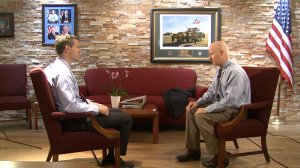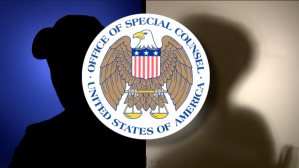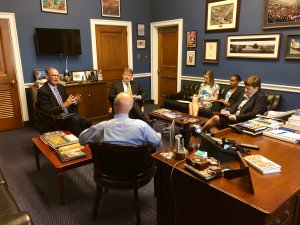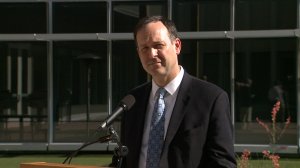DENVER — Imagine making close to $100,000 a year and having nothing to do at the office.
It’s what Denver whistleblowers say was reality for employees at the local Office of the Inspector General for Veterans Affairs.
That’s the very division in charge of wiping out waste, fraud and abuse for the medical system that serves the nation’s veterans.

“These are your tax dollars that are paying the salaries of these individuals to sit in an office and do absolutely nothing all day,” said one anonymous whistleblower to the Problem Solvers.
“After a while it became a joke,” is how a second whistleblower described it.
“Come into work and pretty much staring at the wall all day kind of just hanging out every day pretty much with nothing to do.”
Both whistleblowers filed complaints with the Office of Special Counsel in Washington, stating an office of 11 employees basically did no work from April 2017 to April 2018.
The combined salaries of those employees during that time frame totaled more than $1.2 million.
“Long lunches, I mean watching movies, reading books. I mean I was doing school work. I`m not going to lie I did not have any work assigned. I spent the majority of my time doing school work,” said whistblower No. one, who happened to be a paid intern making $47,214 a year to help conduct information technology audits.

The Problem Solvers obtained copies of the complaints filed with the Office of Special Counsel and the one from whistleblower No. 2 states, “I would have filed this sooner but this office has already had two investigations into management and nothing has happened. The office has actually gotten worse and now you throw in no work.
In mid-June the Office of Special Counsel released a letter to the whistleblowers admitting the Denver OIG office “did not have sufficient work to keep all employees fully engaged on active projects,” though it only acknowledges this for a nine-month period from July 2017 to April 2018, instead of the one-year time frame alleged by the whistleblowers.

“It really gives you no confidence in the system,” said Rep. Mike Coffman, who represents Colorado’s 6th Congressional District.
Coffman said he wants the Veterans Affairs Oversight Committee to investigate how it’s possible an office doing almost no work would then hire three more auditors in May of 2018, each making $95,000 a year.
“It`s a big deal to the taxpayer of United States. It`s a big deal to the veterans that aren’t getting the resources that they should be getting because they’re being wasted in these other areas,” Coffman said.

In its letter of findings the Office of Special Counsel wrote, “Several factors contributed to the lack of assigned work, including the untimely selection and approval of audit topics and the fact that some staff were unfamiliar with the development of quality audit proposals.”
Investigators determined the office would operate better in the future because another manager had recently been hired (in addition to the office director and two existing managers) to help oversee an office as of May that now has 10 auditors instead of seven.
When asked if someone should be fired, whistleblower No. 2 said, “Honestly, yes,” adding it’s “like a slap in face” that no one was held accountable.

In a statement, the Office of Special Counsel wrote, “When a whistleblower disclosed mismanagement related to insufficient workload for some employees, OSC took the allegations seriously and utilized an expedited process to quickly achieve corrective action.”
But the OSC admits that “corrective action” doesn’t include any discipline because “OSC does not have authority to direct an agency to impose discipline.”

Discipline would be up the Office of the Inspector General and in a statement it said, “There is no excuse for employees not to be engaged on meaningful OIG work and low-performing employees have received counseling and corrective action.”
But again the OIG admits “corrective action” did not mean discipline or punishment for any Denver employees.

Coffman met with Michael Missal, the inspector general of the Department of Veterans Affairs.
Missal downplayed the concerns of whistleblowers and in a letter insisted “the facts are not consistent with their claims” even adding the inquiry “did not confirm” that employees did not have sufficient work despite the Office of Special Counsel letter saying almost exactly that.
Coffman said some managers should be held accountable.
“Oh absolutely, people up and down this chain,” he said.
Whistleblower No. 1 said, “I look at the bigger picture and I see the amount of money that has been wasted and I see the amount of VA programs that that money could have been filtered into suicide prevention, opioid programs, things that our veterans struggle with daily and need access to, that`s where this millions of dollars of waste could have gone to.”
There is one position the Denver Office of the Inspector General agreed to eliminate, the paid internship.
That intern was told the program was supposed to lead to a full-time position and the office did in fact hire three more auditors in May.
But the Denver OIG informed the intern she would no longer be needed as of July 10. She suspects it has everything to do with her whistleblower complaint.

On July 17, Coffman raised the Denver whistleblower case with the then-VA Acting Secretary Peter O’Rourke at a Veterans Affairs Committee titled “The VA Accountability and Whistleblower Protection Act: One Year Later.”
According to a letter sent to Coffman, O’Rourke referred the mater to the Integrity Committee of the Council of the Inspectors General on Integrity and Efficiency for “whatever action that body deems appropriate.”
